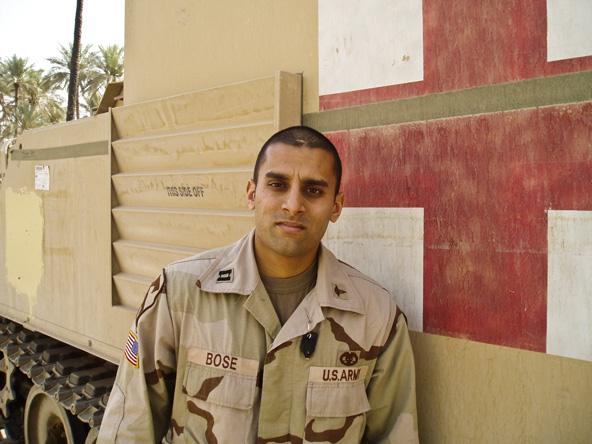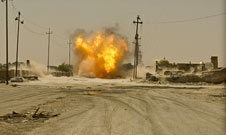
11 June 2004, Baghdad, Iraq. Captain Sudip Bose.
Photo: Phillip Robertson
11 June, 2004, Baghdad, Iraq. They run past the loaded Apaches and out to the Blackhawks parked under the crucible sun, their black hulls covered with big red crosses on white fields. There, the Medevac crew waits by the helicopter for the arrival of an injured soldier. Once they have him, they will fly him to Baghdad for emergency surgery. It is a well-rehearsed routine and they do not say much as they work.
When the young American arrives on a gurney with the bullet wound in his abdomen, the medic lifts him into the helicopter, making sure he is lying on his left side to ease the strain on his heart. If the soldier, whose name is Chris, closes his eyes, the medic talks to him and wakes him up. Over the palm groves north of Baghdad, the medic works out an IV to keep him from going into shock, and watches the flow of saline into his vein. Eight minutes later, the crew is taking Chris off the Blackhawk and running with his gurney through the emergency room doors of the combat support hospital. Dr. Sudip Bose and the staff of the emergency room are there waiting for him.
The injured soldier's doctor, Sudip Bose, is the lanky 30-year-old son of Indian immigrants from Calcutta. He grew up in Illinois and went to Northwestern Medical School, following the path of millions of first generation Americans into the professional universe. But where others opted for safe careers and high paying positions in the civilian world, Bose ended up in the middle of a war. When I first spoke to him, he was sitting behind a desk piled high with packaged snacks in an office he also slept in. Bose was distractedly mixing a protein drink, talking about the need to stay in shape. After a few minutes he spent describing his life, it was clear that Bose is an unlikely soldier. In 1996, after his first year of medical school he took a look at his tuition bill and joined the Army, accepting a deal where the military would pay for a year of education for every year of service.
"It was a tough decision but you have to pay back the debt somehow, and I could have ended up with about two hundred thousand dollars of debt. My parents were struggling with it. There were a couple of choices, I could work 23 hours day and pay it off or pay it off at the age of fifty. You don't know what's going to happen so you don't know if it's a good decision or a bad decision. If you lose an arm or a leg it's a bad decision," he said without irony. In six years, he reasoned that he would be nearly debt free, having paid it back in an honorable way by serving the country.
The Army, for its part, took a look at Bose, saw his quick mind and his skill as a surgeon, and sent him to Iraq where he is now treating a steady stream of Americans and Iraqis for an enormous range of injuries, many of them horrifying. Bose also has the distinction of being the only board-certified physician in emergency medicine for 135,000 Americans and an unknown number of Iraqis. He will treat anyone who comes through the door.
I wanted to know what it was like to practice medicine during a war, so I asked to follow Bose to his medical platoon at the forward base in Khadimiya. There I would see what defenders of the war mean when they insist this is a humanitarian endeavor, that US forces are doing good deeds for Iraqis. I witnessed Bose and his colleagues doing their best to help ordinary Iraqis, along with many other soldiers of the 1st Cavalry. But outside the base, their honest attempts were crippled by resentment and mistrust on both sides. Members of the 1st Cavalry couldn't rely on their Iraqi partners like the Iraqi Civil Defense Corps to be a bridge to the local community, because they believe that ICDC forces stationed on their base were betraying them to the resistance. Medical missions out into the local community had to be kept short for security reasons - temporary clinics which should have been available for a full day, could only stay open for a few hours because of the threat of attacks, and the US forces were attacked all the time.
The result is predictable. The assistance missions have become a kind of cat and mouse game that work like this: Organize a convoy, dart out to an impoverished suburb, provide assistance, and then dart back to the base before the resistance finds out about it and fires a volley of rocket propelled grenades. Whenever the soldiers leave the confines of the forward base in Khadimiya, they are risking their lives to do it, and often the Iraqis are not happy to see them. And yet Khadimiya, unlike Sadr city, is comparatively calm, and is thought to be a hearts and minds success story. "They love us here," one soldier told me. I learned later, after two missions with the 1st Cavalry, what he meant by love was a species of sullen tolerance.
"Watch out for Bose, he brings the rain," one of the ER nurses was telling me just before we got on the convoy to the forward base in Khadimiya. In this scorched climate, we could only hope for rain; the nurse meant that when Bose was around, they were always hit with mass casualties. Rain was bombings, convoy ambushes, nightmare firefights that brought in injured by the dozens. Bose works long hours when the rain comes, performing emergency surgery on the critically wounded. Because the patient load can spike so quickly, he spends his time between the forward base in Khadimiya and the Combat Support Hospital, shuttling back and forth. But there still isn't enough of him to go around. When the staff of the emergency room talks about him, they always mention his intelligence. Bose, who has a great passion for medicine, gives you the impression of of a determined physics student and seems detached at times, slightly dorky. But in five days, I never saw him hesitate over the name of a nerve, small bone or drug. It is not surprising. When Bose took his medical board examinations, he won the highest score in the country. To his colleagues, who have enormous respect for him, he is a star.
Dr. Bose was awarded the Bronze Star for his bravery and service to his country. He is now practicing medicine in Chicago.
We remain friends to this day.
 LEAD IMAGE: 2004, Iraq. A roadside bomb detonating in Iraq, the cause of the majority of injuries to U.S. personnel in Iraq.
LEAD IMAGE: 2004, Iraq. A roadside bomb detonating in Iraq, the cause of the majority of injuries to U.S. personnel in Iraq.Photo: Sudip Bose
© Phillip Robertson, 2009-2014.
